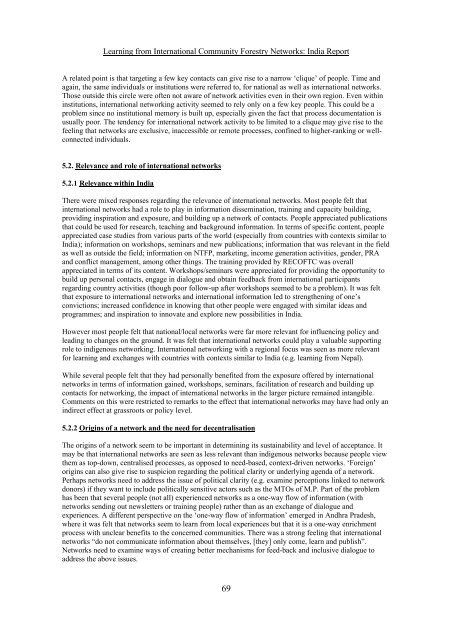Snapshots of International Community Forestry Networks: Country ...
Snapshots of International Community Forestry Networks: Country ...
Snapshots of International Community Forestry Networks: Country ...
You also want an ePaper? Increase the reach of your titles
YUMPU automatically turns print PDFs into web optimized ePapers that Google loves.
Learning from <strong>International</strong> <strong>Community</strong> <strong>Forestry</strong> <strong>Networks</strong>: India Report<br />
A related point is that targeting a few key contacts can give rise to a narrow ‘clique’ <strong>of</strong> people. Time and<br />
again, the same individuals or institutions were referred to, for national as well as international networks.<br />
Those outside this circle were <strong>of</strong>ten not aware <strong>of</strong> network activities even in their own region. Even within<br />
institutions, international networking activity seemed to rely only on a few key people. This could be a<br />
problem since no institutional memory is built up, especially given the fact that process documentation is<br />
usually poor. The tendency for international network activity to be limited to a clique may give rise to the<br />
feeling that networks are exclusive, inaccessible or remote processes, confined to higher-ranking or wellconnected<br />
individuals.<br />
5.2. Relevance and role <strong>of</strong> international networks<br />
5.2.1 Relevance within India<br />
There were mixed responses regarding the relevance <strong>of</strong> international networks. Most people felt that<br />
international networks had a role to play in information dissemination, training and capacity building,<br />
providing inspiration and exposure, and building up a network <strong>of</strong> contacts. People appreciated publications<br />
that could be used for research, teaching and background information. In terms <strong>of</strong> specific content, people<br />
appreciated case studies from various parts <strong>of</strong> the world (especially from countries with contexts similar to<br />
India); information on workshops, seminars and new publications; information that was relevant in the field<br />
as well as outside the field; information on NTFP, marketing, income generation activities, gender, PRA<br />
and conflict management, among other things. The training provided by RECOFTC was overall<br />
appreciated in terms <strong>of</strong> its content. Workshops/seminars were appreciated for providing the opportunity to<br />
build up personal contacts, engage in dialogue and obtain feedback from international participants<br />
regarding country activities (though poor follow-up after workshops seemed to be a problem). It was felt<br />
that exposure to international networks and international information led to strengthening <strong>of</strong> one’s<br />
convictions; increased confidence in knowing that other people were engaged with similar ideas and<br />
programmes; and inspiration to innovate and explore new possibilities in India.<br />
However most people felt that national/local networks were far more relevant for influencing policy and<br />
leading to changes on the ground. It was felt that international networks could play a valuable supporting<br />
role to indigenous networking. <strong>International</strong> networking with a regional focus was seen as more relevant<br />
for learning and exchanges with countries with contexts similar to India (e.g. learning from Nepal).<br />
While several people felt that they had personally benefited from the exposure <strong>of</strong>fered by international<br />
networks in terms <strong>of</strong> information gained, workshops, seminars, facilitation <strong>of</strong> research and building up<br />
contacts for networking, the impact <strong>of</strong> international networks in the larger picture remained intangible.<br />
Comments on this were restricted to remarks to the effect that international networks may have had only an<br />
indirect effect at grassroots or policy level.<br />
5.2.2 Origins <strong>of</strong> a network and the need for decentralisation<br />
The origins <strong>of</strong> a network seem to be important in determining its sustainability and level <strong>of</strong> acceptance. It<br />
may be that international networks are seen as less relevant than indigenous networks because people view<br />
them as top-down, centralised processes, as opposed to need-based, context-driven networks. ‘Foreign’<br />
origins can also give rise to suspicion regarding the political clarity or underlying agenda <strong>of</strong> a network.<br />
Perhaps networks need to address the issue <strong>of</strong> political clarity (e.g. examine perceptions linked to network<br />
donors) if they want to include politically sensitive actors such as the MTOs <strong>of</strong> M.P. Part <strong>of</strong> the problem<br />
has been that several people (not all) experienced networks as a one-way flow <strong>of</strong> information (with<br />
networks sending out newsletters or training people) rather than as an exchange <strong>of</strong> dialogue and<br />
experiences. A different perspective on the ‘one-way flow <strong>of</strong> information’ emerged in Andhra Pradesh,<br />
where it was felt that networks seem to learn from local experiences but that it is a one-way enrichment<br />
process with unclear benefits to the concerned communities. There was a strong feeling that international<br />
networks “do not communicate information about themselves, [they] only come, learn and publish”.<br />
<strong>Networks</strong> need to examine ways <strong>of</strong> creating better mechanisms for feed-back and inclusive dialogue to<br />
address the above issues.<br />
69

















![CynefinFramework final [Read-Only]](https://img.yumpu.com/19017304/1/190x135/cynefinframework-final-read-only.jpg?quality=85)